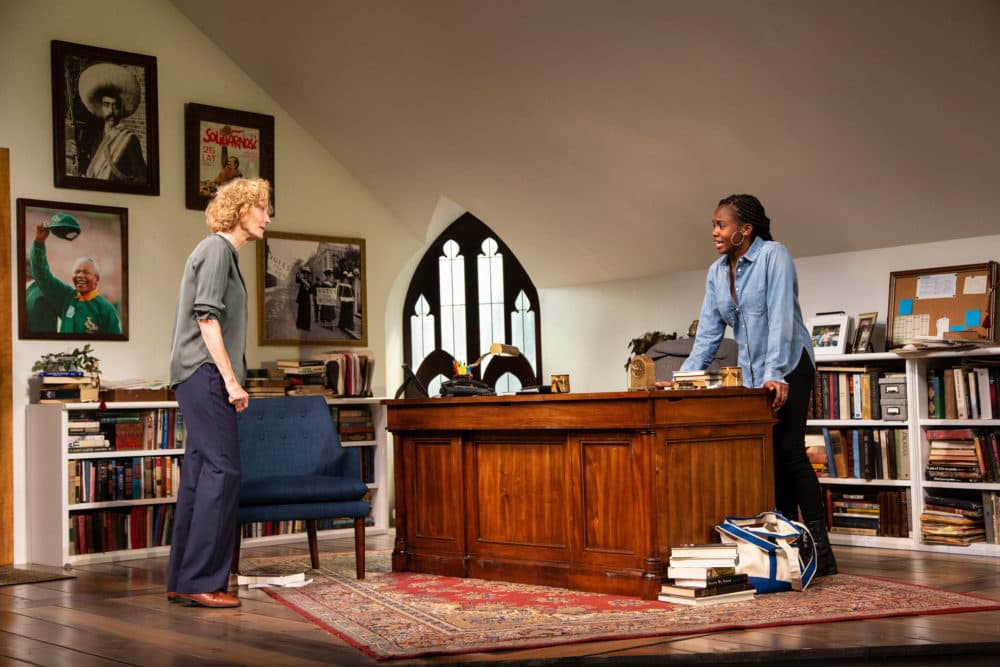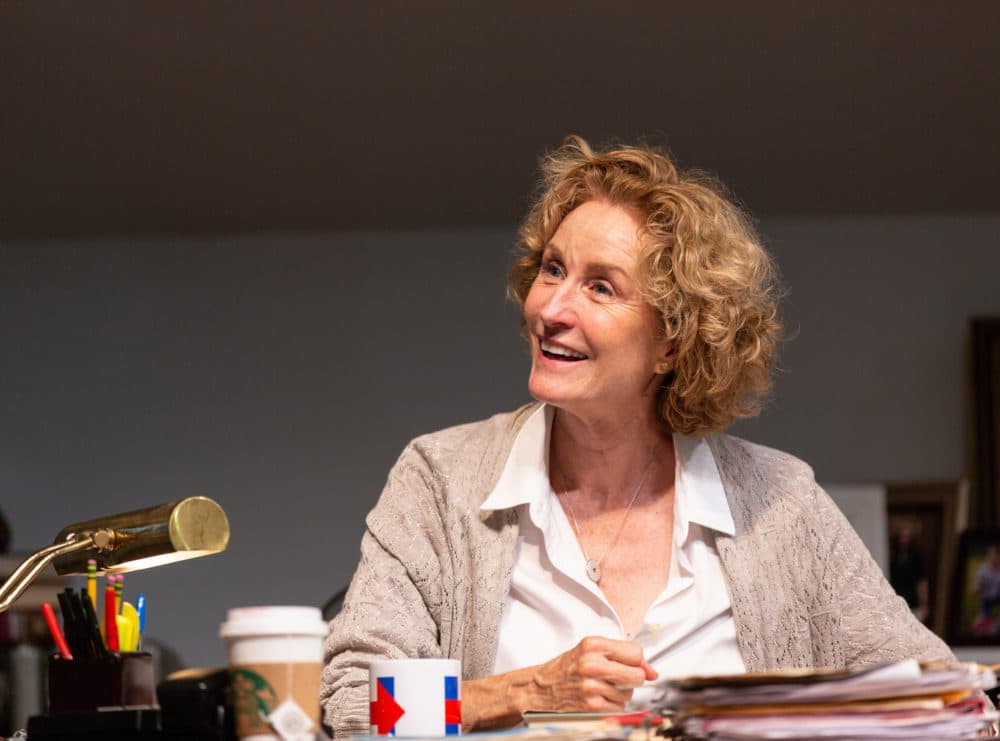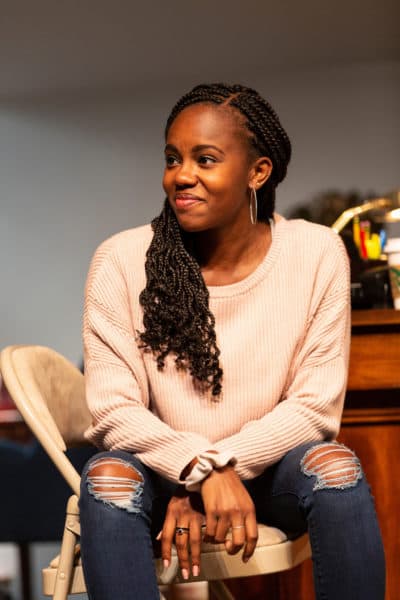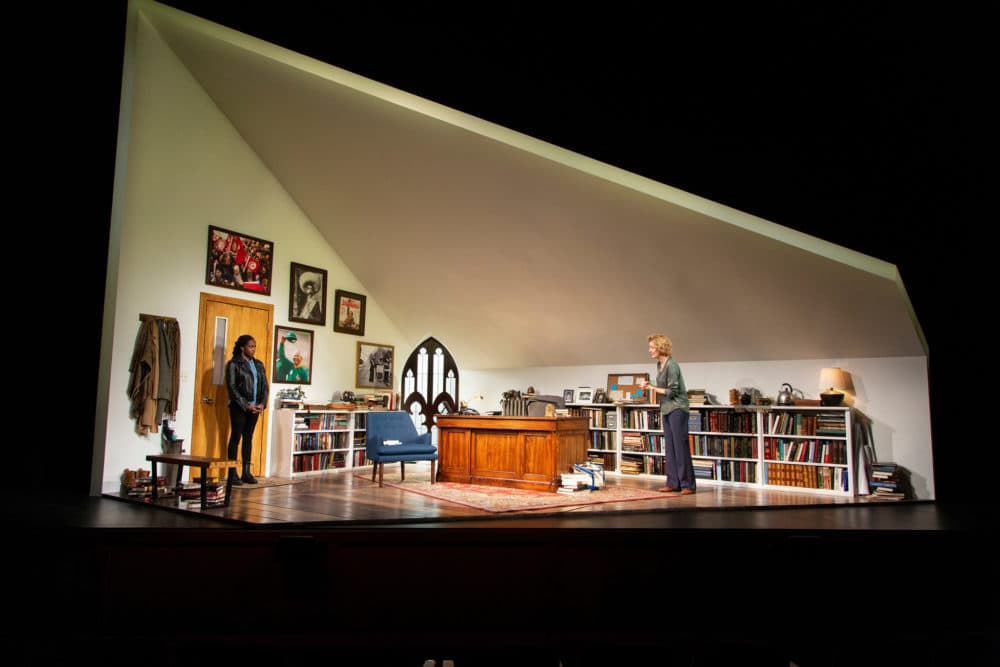Advertisement
Review
'The Niceties' Illustrates Privilege, Racial Tension And Dismissive Attitudes At The Huntington

The power dynamic between a teacher and a student provides built-in dramatic possibilities, especially when the scene is set in the privileged atmosphere of an Ivy League university.
Playwright Eleanor Burgess, whose “The Niceties” opens the Huntington Theatre Company season, ramps up the tension by tapping into a debate about who gets to tell the story of American history. “The Niceties,” now playing in the Wimberly Theater at the Calderwood Pavilion, sets up the situation with white, liberal history professor Janine (Lisa Banes) and her black student Zoe (Jordan Boatman).
Zoe has come to her professor’s office hours to discuss revisions on a draft of a paper positing that the American Revolution was only successful because of the existence of slavery. Even poor whites benefited from the subjugation of 20 percent of the population and were thus content enough to stage only a moderate revolution — not a radical one, a means that ensured the revolt’s success.
Janine questions Zoe’s thesis, and the internet sources used to support it, saying Zoe needs primary sources to prove such an argument. Zoe is quick to defend her work: Primary sources from enslaved persons rarely exist. What follows is a session of verbal sparring that illustrates a generational and racial chasm between the two women — both liberal, both feminists and yet so far apart.
In her well-intentioned but tone deaf efforts to elevate Zoe’s work, Janine — who seems to enjoy imparting knowledge not only for the student’s sake, but to listen to the sound of her own voice — shares a series of anecdotes that reveal just how much she sees the world from the place in it which she occupies (as do we all).

She shares an obscure reference to a colonial era passage that frames the oppression of Indians in a poetic, playful way. She insists on primary sources, even if they come from exclusively white sources. She wishes she could have been in the room when George Washington planned the revolution. Zoe points out she would have been enslaved in that room. Janine offers a rebuttal: She too would have been only a wife or a servant. That’s a false equivalency, Zoe snaps back.
Zoe declares Janine insensitive to ideas outside Janine’s elitist academic community and raises the stakes by saying she is unfit to teach. Has Janine noticed she mispronounces the names of her students of color? That she talks over black women, Zoe asks?
For her part, Zoe’s actions display a naiveté for the academic circles she navigates. She can’t make revisions on her paper, lest she miss protests on the weekends. She needs at least an A minus, she declares with an air of entitlement. She almost always refuses compromise, constantly deriding incremental progress.
We soon learn Zoe began recording the conversation after it had become heated. Janine retreats, panics. What can she do to make Zoe delete the clip? Admit you’re a racist, Zoe demands. The subtext for the audience: Surely, Janine has been insensitive, but does she deserve to be blackmailed when there are bigger fish to fry?

Burgess, a former Huntington Playwriting Fellow, has an ear for the dismissiveness that defines so much of our public discourse. She clearly has a command of labels tossed about willy-nilly in our current climate of polarized harangues in lieu of discussions, and the recognition of how disturbing those banal generalizations can be.
The condescending tone each character takes when dismissing the other is barbed, even when the complaints each one makes has validity. But Burgess hews so closely to the outline of David Mamet’s 1992 play “Oleanna,” including the blackmail, the repercussions for the professor and a touch of physical violence, that “Niceties” offers only an echo chamber rather than an opportunity for thoughtful insight or consideration.
Banes and Boatman generate some powerful sparks in the cat-and-mouse game they must breathe life into, and each delivers a character driven by passion and determination. The actors nimbly inhabit the stereotypical characteristics of entitled millennial and older, oblivious academic, even as the characters decry the very idea they might be labeled that way. That’s particularly notable since Burgess offers little in these characters the audience might empathize with. Both Janine and Zoe are self-absorbed and arrogant, insistently tone deaf to the merits of the other’s arguments.
Although the second act offers us a little window into Janine’s personal story, it only happens when Zoe insults her and she feels compelled to open up about her background and share telling personal details. Even with those revelations, these characters display little vulnerability or potential for growth — essential elements of compelling drama. When Zoe shouts, “I’m a person, not a walking manifesto,” we can only wonder who that person is. When Janine sneers, “No one wants to hear any more about racism,” it’s nearly impossible to square that with her profession as a historian.

While the claustrophobic setting of a history professor’s book-littered office offers limited opportunities for dynamic staging, director Kimberly Senior relies on a static repetition of each character alternating between sit down, stand up, take four steps.
Early in the play, Janine suggests Zoe add personal stories to make history come alive in her paper. But that is exactly what is missing from “The Niceties.” We have only to turn on the TV talk shows or political debates to hear the platitudes that get tossed back in forth between these two-dimensional characters.
At a time when most plays about race end with a tired, drippy arc in which the characters find their way to a shared humanity despite their differences, Burgess skips that trope. Instead, she deftly reflects the unromantic reality that there is often no resolution to our ideological divides. This is messy stuff.
Still, Burgess’ socratic debate style reinforces rather than challenges our inability to listen to another viewpoint. What that adds to the conversation is a matter for a different debate, or another play.